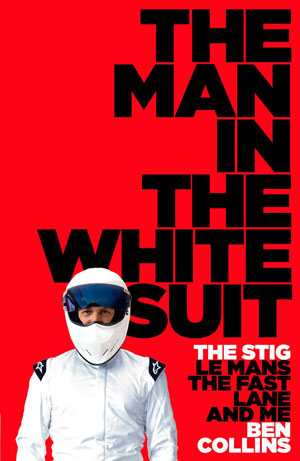 The Man in the White Suit The Man in the White Suit
The Stig, Le Mans, The Fast Lane and Me
On September 1st 2010, Ben Collins and his publishers
won a High Court case, overturning an injunction
placed on them by the BBC that prevented Ben
releasing his autobiography. That landmark decision
opened the way for HarperCollins to press the
button that set the presses rolling, and a fortnight
later, The Man in the White Suit hit
the bookshelves.
Within
its 300-odd pages Ben tells a remarkable story
and explores a myth. As many within the motorsport
industry had accepted for years, he confirms
that he, Ben Collins, is (or was!) The Stig.
That white-suited faceless one, the perplexing
and inscrutable test driver who, as everyone
knew, could punch a horse to the ground with
a single blow, never blinked, and had a left
nipple shaped like the Nürburgring, was
actually a chap from Bristol, married with three
children.
The
announcement swept across the media like the
1987 hurricane, toppling legend and folklore
like so many lofty poplars, and sending lanky,
curly-haired TG presenters (allegedly) apoplectic
with rage. It was all a bit bewildering at
the time, and some wondered what the fuss was
all about. After all, hadn’t the media
exposed Ben almost a year previously? Hadn’t
even the BBC’s
own publication, the Radio Times, run a feature
that pointed the finger at Ben? It was bizarre.
Now, a month later, the dust has settled, and
Ben’s chat show appearances are all but
over. In that atmosphere of relative calm we
can have a look at the item that created this
furore; Ben’s book.
The
Man in the White Suit is
the tale of a man only a very few people knew,
but everyone had heard of: Ben Collins, alias
The Stig, and it falls into two fairly distinct
halves. The first bobs and weaves like Cassius
Clay on PowerBoks, dancing some chronoclastic
tango as it swirls between Ben’s first Top
Gear “audition”,
his childhood in America, trials to join the
Army, and the realisation that a future in Formula
1 was probably beyond his grasp. The second half
concentrates on Ben’s experiences as Top
Gear’s Stig, from testing high-performance
supercars to firing up the Blackpool illuminations.
Ben’s early dream had been to become a
fighter pilot, but failing the 20-20 vision test
put paid to that. Ben could have made it as an
Olympic-standard swimmer, but you get the feeling
that the early morning plunge and tedious training
sessions didn’t really appeal. Instead,
Ben looked to motor racing, and with the help
of his Dad, he embarked on what proved to be
a very successful grass-roots introduction.
Ben
joined the ranks of those many hundreds of
talented, eminently capable and possibly mercurial
racing drivers who could have made it all the
way to Formula 1. In Ben’s case, he got
closer than most, and certainly made many of
the right moves, but like all those others, lost
out for the simple fact that he hadn’t
got the financial backing. Money, supposedly,
talks. In motor racing it positively screams,
and Ben’s tale of oh-so-nearly-but-not-quite
comes across strongly in the opening chapters.
If
what he says is accurate, then Ben’s
case was a very strong one, but he arrived too
late at the party. Most of those around him were
a year or two younger and had flourished in the
karting academy. They were mere whippets compared
to Ben’s Great Dane, and being too tall
to have made it in karts was a factor that worked
alongside his lack of money to deny him the future
he craved. Few, aside from Ben’s good friend
Mark Webber, have been tall, lanky, and successful
Formula 1 drivers.
Ben
changed direction, and looked for drives in
sports and GT cars. Luck smiled, and chance
encounters with the likes of Werner Lupberger
created the introductions and opportunities that
lead to a Le Mans debut with Ascari. I remember
Le Mans in 2001, and recall being eternally grateful
that my work that year allowed me to stay indoors
for much of the race. There I could watch the
timing screens and follow the race on TV, while
drivers like Ben – and particularly those,
like Ben, in open-topped prototypes – endured
hour after hour of unrelenting rain.
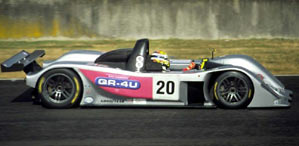 It
was a Biblical deluge that took no prisoners.
Track conditions were treacherous and totally
unforgiving, but Ben relished every moment, and
for four hours was consistently the quickest
driver on the track, sometimes by as much as
ten seconds a lap. It was the kind of performance
that makes stars, opens the eyes of factory head-hunters,
and secures a top flight future. In Ben’s
case, it didn’t, and for two very simple
reasons. It
was a Biblical deluge that took no prisoners.
Track conditions were treacherous and totally
unforgiving, but Ben relished every moment, and
for four hours was consistently the quickest
driver on the track, sometimes by as much as
ten seconds a lap. It was the kind of performance
that makes stars, opens the eyes of factory head-hunters,
and secures a top flight future. In Ben’s
case, it didn’t, and for two very simple
reasons.
Firstly,
the car didn’t take the lead,
as it evidently would have done. In fact, it
didn’t even record a worthy top-five finish,
because soon after Ben had unlapped himself,
and was chasing down on the leading Audi, a simple
five-bob bit of wiring gave way. He coasted to
a halt at Indianapolis and the Ascari was out
of the race. Even so, his stint had been so extraordinarily
brave, so stunningly quick, that surely someone
would have noticed? Well, no, and for Reason
Number Two. All this happened in the middle of
a miserably wet night, when chief executives
and decision makers were tucked up in bed, leaving
the hard work to pitwall managers and engineers.
It must have been a bit like the star performer
in a stage production coming out for the curtain
call only to discover that the audience has abandoned
the theatre because of a burst pipe. It’s
a sad fact in endurance racing that remarkable
stints from mid-race drivers are so often forgotten,
simply because it’s the results sheet that
records those races for posterity. If the car
fails, so does the memory.
Ben
and the Ascari did win races, and the nimble
A410 could have become a very successful sports
prototype if the reliability had been better.
2002, the year after Ben’s Le Mans debut
with the works team, the car finished 6th at
Sebring (although Ben recalls it as fifth!) and
was running high at Le Mans too before a suspension
failure pitched the car off-piste. That effectively
signalled the end of the Ascari LMP works effort,
and with other opportunities drying up, Ben was
forced to consider a back-up career; the Army.
After
failing to pass physical for the Air Force,
having to join the pongos must have seemed like
second-best for Ben, but he nearly didn’t
make it through the Army medical either. This
time it was because his hearing had suffered
from nearly ten years with his head stuffed up
against a racing engine, and he needed a surreptitious
in-ear deaf-aid to sneak through the examination.
He joined the Army Reserve Regiment and embarked
on a gruelling sequence of training exercises
that weeded out the top twenty or so from over
200 new recruits. Ben made the grade.
As
luck would have it, 2003 was the year it all
kicked off again for Ben. His appointment as
the new Top Gear Stig, replacing Perry McCarthy’s “Black
Stig”, was confirmed. Ironically, Perry
had lost the job because he’d admitted
to his alter ego in an autobiography.
His “death” was staged to great effect
when the Jag he was supposedly driving was catapulted
off the flight deck of an aircraft carrier and
sank without trace.
Perry
had lasted little over a year, and long before
his admission appeared in print, his identity
as the Stig was common knowledge. Ben’s
characteristic dedication to duty ensured he’d
hold onto the job for more than seven years,
and even if his erstwhile colleagues are reluctant
to admit it now, Ben was largely responsible
for establishing the style and persona that came
to epitomise his enigmatic Top Gear character.
Like many good actors, Ben took the part and
built it up, creating a role for himself that
made him increasingly indispensable.
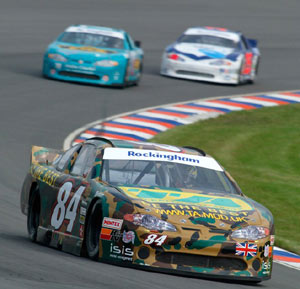 Ben
pitched in as the “White Stig” with
gusto, and ultimately did much to establish what
became the mysterious cult of The Stig. Back
in 2003, when he embarked on his journey as the
fourth TG presenter, the rest of his life was
also falling into place. His long-standing on-off
relationship with Georgie, who would later become
his wife, was flourishing once again; he had
a future in the Army; he had a paying job (albeit
a rather open-ended one) with the BBC; and he
was back in the driving seat with a winning race
team; RML. Ben
pitched in as the “White Stig” with
gusto, and ultimately did much to establish what
became the mysterious cult of The Stig. Back
in 2003, when he embarked on his journey as the
fourth TG presenter, the rest of his life was
also falling into place. His long-standing on-off
relationship with Georgie, who would later become
his wife, was flourishing once again; he had
a future in the Army; he had a paying job (albeit
a rather open-ended one) with the BBC; and he
was back in the driving seat with a winning race
team; RML.
The
American craze for racing round in circles
had arrived in little ol’ England in the
shape of the astonishing Rockingham Oval. This
massive colosseum of a racetrack had recently
been built on wasteland outside Corby in Northamptonshire,
just down the road from RML’s Wellingborough
headquarters. They were to run one of the stock-built
cars that would mimic the Stateside NASCAR championship,
called ASCAR (Ass-car!? queried the
incredulous Yanks) in Europe, and sponsored by
the Army. Ben’s newfound status with the
ARR made him the perfect candidate for the driver’s
seat. An initial trial proved he was well up
to the task, leading both races and winning one.
Despite a lack of funding, RML persevered with
the season, and Ben duly rewarded their faith
by dominating the year and taking the title.
If
Ben believed this put him back on track, in
every sense, for a career as a racing driver,
he soon had to think again. RML withdrew, and
his replacement car for 2004 with another squad
was a total dog. Things went from bad to worse,
and before 12 months was out, Ben’s racing
future was back to square one.
Ben’s loss is his reader’s
gain, because from this point onwards the book
regains a cohesive structure that had been
in danger of slipping out of reach during the
mid-race stint. Trying to juggle tales of derring-do
in the Brecon Beacons with his early days at
Dunsfold, while simultaneously keeping us up
to speed on his racing exploits and (admittedly
only in passing reference) his personal life,
seems to have been a bit of a challenge, but
having weathered the storm, Ben then settles
down into a more regular pattern focused upon Top Gear and The
Stig.
That’s not to say that I didn’t
enjoy the opening sequences – I did, and
thoroughly so, probably helped by the fact that
Ben was recalling incidents in his life in which
I had played a very small part. His accounts
of racing at Le Mans are vibrant, pacey and well-crafted.
His descriptions of overcoming the challenges
of forced marches through the mountains of Wales
are gritty, dark and atmospheric, capturing the
physical pain in equal measure with the elation
of success. It’s a good read, but it’s
the second half of the book that will be this
book’s major appeal, at least to the Top
Gear cognoscenti who, one hopes for Ben’s
sake, will propel The Man in the White Suit into
the best-seller chart.
 Here
Ben devotes the pages to his life as The Stig,
and they’re packed with anecdotes
about celebrities and stunts, exotic cars, glamorous
locations and his relationship with the guys
on Top Gear. As anyone who’s met him will
affirm, Ben’s an affable guy; friendly,
open, and easy-going, and he obviously slipped
into the groove very readily. He soon learned
what was required of The Stig, understanding
the film crew’s expectations yet ever conscious
of their skill and the risks they took. He also
came to know his fellow presenters, developing
a respect for all three of them: Jeremy Clarkson
for his abilities as a quick-fire presenter and,
it seems, a bewitchingly competent driver; Richard “Space
Hopper” Hammond for his selfless bravery
and sense of fun; and James May for his encyclopaedic
knowledge and baffling capacity to portray a
slightly off-planet personality which, if not
exactly true to life, was the perfect foil to
his colleagues. Here
Ben devotes the pages to his life as The Stig,
and they’re packed with anecdotes
about celebrities and stunts, exotic cars, glamorous
locations and his relationship with the guys
on Top Gear. As anyone who’s met him will
affirm, Ben’s an affable guy; friendly,
open, and easy-going, and he obviously slipped
into the groove very readily. He soon learned
what was required of The Stig, understanding
the film crew’s expectations yet ever conscious
of their skill and the risks they took. He also
came to know his fellow presenters, developing
a respect for all three of them: Jeremy Clarkson
for his abilities as a quick-fire presenter and,
it seems, a bewitchingly competent driver; Richard “Space
Hopper” Hammond for his selfless bravery
and sense of fun; and James May for his encyclopaedic
knowledge and baffling capacity to portray a
slightly off-planet personality which, if not
exactly true to life, was the perfect foil to
his colleagues.
 Although The Stig played a boundless variety
of roles within the Top Gear panoply,
it was his coaching of the Stars in the “reasonably
priced car” that occupied most of his time
at Dunsfold. As a result the index in the book
reads like a who’s who of contemporary
celebrity, and Ben recollects their strengths
and weaknesses, foibles and idiosyncrasies in
an amusing and insightful way. Sportsmen and
women such as Usain Bolt, Lawrence Dallaglio
and Ellen MacArthur rub pages with comedians
like Harry Enfield, Eddie Izzard and Jimmy Carr.
Musicians Lionel Ritchie and Jay from Jamiroquai
are analysed and reported with as much enthusiasm
and honesty as filmstars Ewan McGregor, Tom Cruise
or Hugh Grant. There’s also room for the
ladies, of course, with Cameron Diaz, Geri Halliwell,
Sienna Miller, Jodie Kidd and Katie Price all
being strapped, some more tightly than others,
into the driving seat. Although The Stig played a boundless variety
of roles within the Top Gear panoply,
it was his coaching of the Stars in the “reasonably
priced car” that occupied most of his time
at Dunsfold. As a result the index in the book
reads like a who’s who of contemporary
celebrity, and Ben recollects their strengths
and weaknesses, foibles and idiosyncrasies in
an amusing and insightful way. Sportsmen and
women such as Usain Bolt, Lawrence Dallaglio
and Ellen MacArthur rub pages with comedians
like Harry Enfield, Eddie Izzard and Jimmy Carr.
Musicians Lionel Ritchie and Jay from Jamiroquai
are analysed and reported with as much enthusiasm
and honesty as filmstars Ewan McGregor, Tom Cruise
or Hugh Grant. There’s also room for the
ladies, of course, with Cameron Diaz, Geri Halliwell,
Sienna Miller, Jodie Kidd and Katie Price all
being strapped, some more tightly than others,
into the driving seat.
Ben
evidently has admiration for many of those
he tutored into the delights of Gambon or the
Hammerhead, and especially celebrity chefs Jamie
Oliver and Gordon Ramsay. Both passed muster
with flying colours, as did Mr Nasty himself,
Simon Cowell. Even comic turned actor Johnny
Vegas, who’d never really driven before,
clocked an almost passable time under Ben’s
direction, but like all the others, had no idea
who’d transformed his hesitant hops into
fluid motion. Ben was always hidden behind the
darkened visor, and if ever he met one of his
protégés again under different
circumstances, had to feign ignorance and walk
on by.
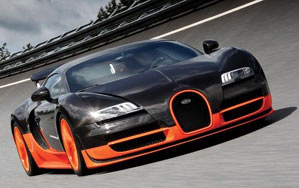 Ben fills in the gaps on several of his Top
Gear highs and lows – the Bugatti
Veyron clearly left a lasting impression, as
did the awesome but aerodynamically challenged
Koenigsegg CCX. Ben’s heartfelt concerns
over Richard Hammond’s crash in the Vampire
jet car are expressed with compassion and a
genuine sense of anxiety (if rather briefly),
and he rounds off with some zesty recollections
of some of Top Gear’s best-remembered
stunts, including blowing up a Mitsubishi Evo
7 with his old chums in the Army. Ben fills in the gaps on several of his Top
Gear highs and lows – the Bugatti
Veyron clearly left a lasting impression, as
did the awesome but aerodynamically challenged
Koenigsegg CCX. Ben’s heartfelt concerns
over Richard Hammond’s crash in the Vampire
jet car are expressed with compassion and a
genuine sense of anxiety (if rather briefly),
and he rounds off with some zesty recollections
of some of Top Gear’s best-remembered
stunts, including blowing up a Mitsubishi Evo
7 with his old chums in the Army.
The
end, when it comes, is the only disappointment
in an otherwise very enjoyable romp. I’m
sure there was so much more of this story to
tell, but Ben throws in the towel almost as an
afterthought. The reader is just getting into
the swing of another tale about the Veyron when,
in three short paragraphs, Ben’s career
as The Stig abruptly ends. Aside from a few hints
that things at Dunsfold weren’t going as
smoothly as they once had, there’s no warning,
and very little explanation, for what must have
been a monumental life-changing decision. Although
I can accept that Ben was under pressure to get
the book published soon after the High Court
decision was announced, I still believe this
final instalment could have been given more of
a flourish and tied off a little more neatly.
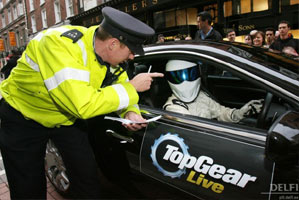 That
aside, Ben has a frenetic, edgy style that
keeps the book rattling along at a fair old
pace. I have to be honest and admit that this
is often not the Ben I’ve come to know. There are
phrases and a word structure here that I could
never hear coming from Ben in conversation, and
I suspect he’s made a huge effort to adapt
his style to meet the expectations of his Top
Gear fanbase. There’s a potential
350 million readers out there, dedicated TG enthusiasts
from across the world, who might be tempted to
buy his book, and those that do won’t be
disappointed. It’s a far better read than
most “celebrity” authors ever manage,
and it will largely meet the expectations of
those seeking an insight into the shadowy, furtive
world of The Stig. That
aside, Ben has a frenetic, edgy style that
keeps the book rattling along at a fair old
pace. I have to be honest and admit that this
is often not the Ben I’ve come to know. There are
phrases and a word structure here that I could
never hear coming from Ben in conversation, and
I suspect he’s made a huge effort to adapt
his style to meet the expectations of his Top
Gear fanbase. There’s a potential
350 million readers out there, dedicated TG enthusiasts
from across the world, who might be tempted to
buy his book, and those that do won’t be
disappointed. It’s a far better read than
most “celebrity” authors ever manage,
and it will largely meet the expectations of
those seeking an insight into the shadowy, furtive
world of The Stig.
That
said, I can’t help feeling a little
sad, and even some degree of personal loss, that
the enigma that has been The Stig is no more.
I rather enjoyed being one of those few who shared
the knowledge of The Stig’s true identity.
There was a certain frisson of quasi-celebrity
from knowing that others knew that I knew, but
knew I wouldn’t tell. I’m sure I’m
not the only one who’ll miss that. Ben
undoubtedly will, but as he insinuates in the
final chapters of the book, he was left with
little choice. The “White Stig” had
run his course. It had been a wonderful experience,
and enormous credit to Ben for keeping the mystery
alive for so long. Regrettably, however, the
unrealistically restrictive contract, the lack
of appreciation for the character he’d
created, (but could never benefit from) and the
enormous imbalance between his perceived status
within the Top Gear hierarchy and the meagre
paypacket he took home meant that the end was
in sight.
 If
the writing wasn’t actually on the
wall yet, it certainly had to go down on paper,
and Ben needed to have everything in place before
the fan started spinning. He tells us there’s
an unfinished graffito on the wall in the Dunsfold
dunny that reads “Richard Hammond is a
. . .” One suspects that others far more
colourful and invective will have joined it by
now, and all signed “JC”. If
the writing wasn’t actually on the
wall yet, it certainly had to go down on paper,
and Ben needed to have everything in place before
the fan started spinning. He tells us there’s
an unfinished graffito on the wall in the Dunsfold
dunny that reads “Richard Hammond is a
. . .” One suspects that others far more
colourful and invective will have joined it by
now, and all signed “JC”.
Some say he can read a book from its cover,
and can control the keyboard merely by using
the power of his mind, but we now know him simply
as Ben Collins, author and one-time Stig.
Postscript
Ben has joined
Channel 5’s Fifth Gear programme
as a co-presenter with Tiff Needell, Vicki
Butler-Henderson and Jason Plato. He made his
first appearance tonight, Friday October 8th,
track-testing a dragster at Santa Pod raceway.
Channel 5 head of factual entertainment, Steve
Gowans said that they were "delighted
to have Collins on board. It will be great
to see him going head-to-head with Jason and
Tiff, the best drivers on television." Check
out the Fifth
Gear website for more details.
Ben
has recently launched a new website: Ben Collins
For
further information, please contact the publishers, HarperCollins.

|